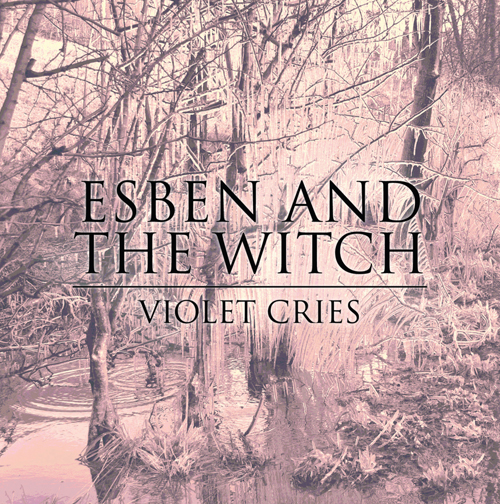If there was ever a band wrongly tarred as much as Esben and the Witch have been, I have yet to hear about them, or indeed, hear them. Go to any other site to get a description of the band or their debut album, Violet Cries, and you’ll be greeted with by the word “Goth” and usually after that you will come across the word “Revival.” Maybe it is because they have “Witch” in their name, maybe it’s the echo on the vocals, it could even be something else. Whatever that “it” is, it does the band a great disservice. Esben and the Witch are far, far more than just a Goth revival band, just as much at home in electronic glitches and whirls as they are in reverb drenched atmospheric pieces.
Opener “Argyria” is nothing less than a sonic assault; a brooding piece of music that slowly builds until it blossoms into an explosion of cacophonous guitars and expertly placed electronic twitches that suddenly stops to reveal a softer and more melodic side of Esben and the Witch. This provides the perfect kind of juxtaposition and owes more to the post-rock scene than any other. In fact, the opener perfectly encapsulates Violet Cries, a schizophrenic kind of album that lurches from one direction to another with ease but retains a continuity. There is an incredible amount of attention that seems to have been paid to making this album flow from start to finish. “Marching Song” sounds like U2 completely demented and industrialized, “Chorea” is a hybrid of post-rock and dance; the song building once, slowing again, then coming to the kind of conclusion that leaves the listener wanting more but never getting it. It’s the absolute definition of a musical tease. “Marine Fields Glow,” “Light Streams,” and “Hexagons IV” are a vehicle to show-off Rachel Davies’ dreamy vocals, the consecutive songs adding a certain atmosphere to the album after the bombast of the opening two songs.
It is hard to keep describing individual tracks and make those descriptions interesting enough to make the album sound attractive to a potential listener, especially if the album strays into post-rock territory. “Eumenides” builds and explodes just like other tracks, and “Swans” is as downbeat as any other downbeat song on Violet Cries. However, they are still of such exceptional quality that it doesn’t matter if they are similar to other songs and as the closing songs on Violet Cries there is added resonance to them.
Violet Cries is an extraordinary album, a triumph in merging industrial sounds with gothic atmospherics and tones. It is a piece of work that proves post-rock is not a dead genre, but rather a genre that can keep evolving and even include vocals (who knew?). Rachel Davies is a haunting vocalist; her soft voice is hypnotic when married to the gloomy atmospheres. The vocals are not the only thing that vaunt Violet Cries into great album territory however, it is the maturity this young band possesses in the execution of their exciting compositions. Let us hope this isn’t a flash-in-the-pan success and that subsequent releases are just as good.

